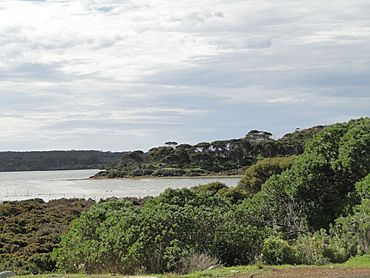Pelican Lagoon Conservation Park facts for kids
Quick facts for kids Pelican Lagoon Conservation ParkSouth Australia |
|
|---|---|
|
IUCN Category Ia (Strict Nature Reserve)
|
|

Pelican Lagoon Conservation Park, Kangaroo Island, South Australia
|
|
| Nearest town or city | American River |
| Established | 16 March 1967 |
| Area | 4.49 km2 (1.7 sq mi) |
| Managing authorities | Department for Environment and Water |
| See also | Protected areas of South Australia |
Pelican Lagoon Conservation Park is a special protected area in the Australian state of South Australia. It's found on the Dudley Peninsula on Kangaroo Island. This park was created in 1967 to protect the homes of many wild animals and plants.
About Pelican Lagoon Park
This conservation park is quite large, covering about 449 hectares. That's like 1,100 acres! It's located right next to the town of American River. It's about 25 kilometers (15 miles) southeast of Kingscote and 19 kilometers (12 miles) southwest of Penneshaw.
The park includes land on the northern side of the Pelican Lagoon tidal inlet. It also has five small islands inside the inlet itself. The park is a mix of different natural areas. You can find woodlands, scrub, and heath plants here. There are also wetlands and muddy areas called samphire mudflats. All these different habitats provide homes for many types of birds and other animals.
Pelican Lagoon Conservation Park is a very strict nature reserve. This means it's mainly for protecting nature and scientific research. It's also next to the American River Aquatic Reserve, which protects the water life.
Islands in the Lagoon
There are five small islands within Pelican Lagoon that are part of the conservation park. If you look from east to west, these islands are:
- Rabbit Islet
- Goanna Islet
- Pig Islet
- Wallaby Islet
- Shag Rock
History of the Park
The land that makes up Pelican Lagoon Conservation Park first became a protected area on March 16, 1967. It was set aside to protect animals. Later, on April 27, 1972, it was officially named the Pelican Lagoon Conservation Park. This happened under a law called the National Parks and Wildlife Act 1972. In 1980, the park was recognized as an important heritage site on the now-closed Register of the National Estate. As of 2018, the park covers an area of 4.49 square kilometers.


